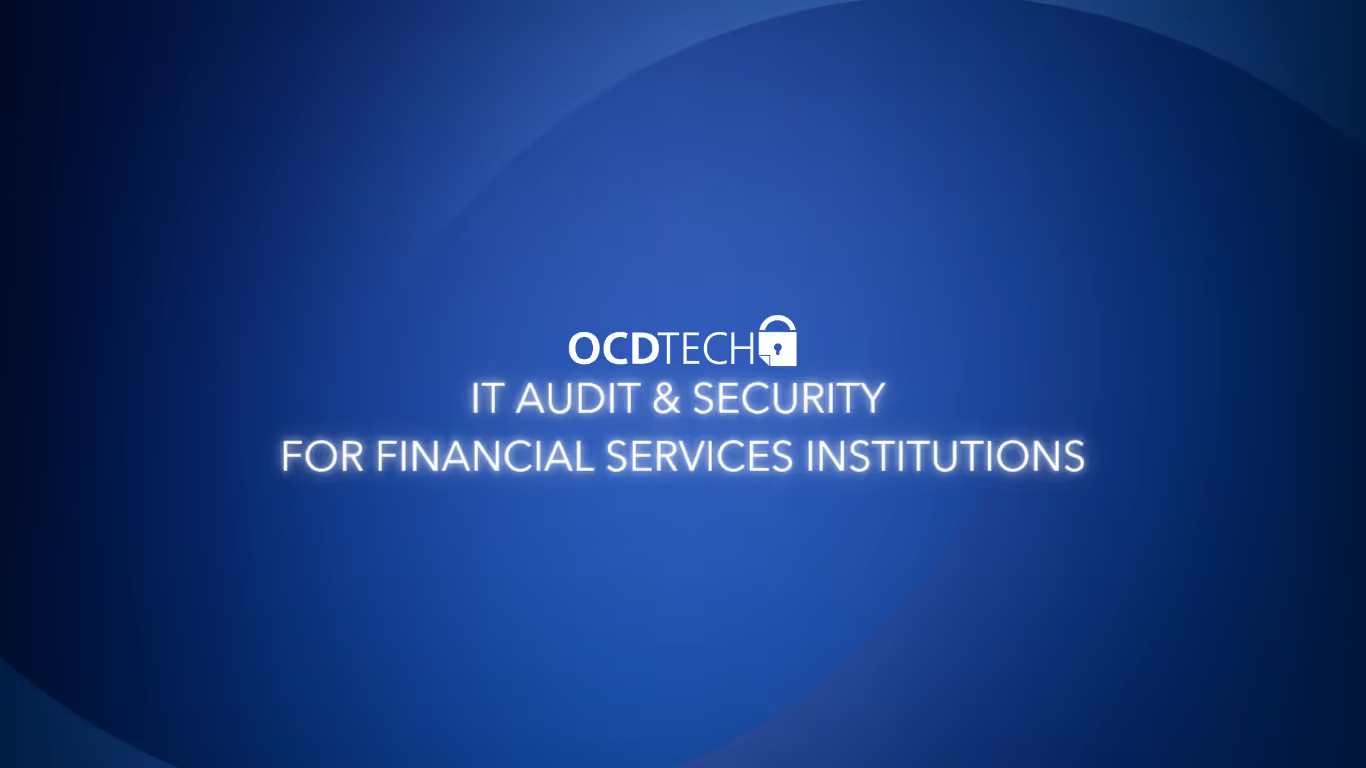By
OCD Tech
November 28, 2023
•
3
min read

Financial transactions are increasingly digitized, the importance of robust IT audit and security measures cannot be overstated for financial services institutions. As custodians of sensitive client data and stewards of financial stability, these institutions face unique challenges in safeguarding their systems against a myriad of cyber threats. Join OCD Tech to explore the critical aspects of IT audit and security for financial services institutions, emphasizing the need for a proactive and comprehensive approach.
Financial services institutions operate in an environment where cyber threats are continually evolving. From ransomware attacks to phishing schemes, the range and complexity of threats demand a thorough understanding of the cybersecurity landscape. Conducting a comprehensive risk assessment is the first step towards identifying potential vulnerabilities and devising effective countermeasures.
Regulatory Compliance
The financial sector is heavily regulated, and compliance with industry-specific standards is non-negotiable. Institutions must stay abreast of regulations such as GDPR, PCI DSS, and others relevant to their operations. Regular IT audits ensure that the organization not only meets these compliance requirements but also demonstrates a commitment to maintaining the highest standards of data protection.
Data Encryption and Access Controls
Data is the lifeblood of financial institutions, and protecting it is paramount. Implementing robust encryption protocols ensures that sensitive information remains secure, both in transit and at rest. Access controls should be strictly enforced, with a principle of least privilege in place to restrict access only to those who require it for their specific roles.
Incident Response Planning
Despite best efforts, incidents may occur. Having a well-defined incident response plan is crucial for minimizing the impact of a cybersecurity breach. This plan should include clear communication protocols, steps for isolating affected systems, and a process for investigating and documenting the incident. Regularly testing the incident response plan through simulated exercises ensures that the organization is well-prepared for real-world scenarios.
Employee Training and Awareness
Employees are often the first line of defense against cyber threats. Comprehensive training programs should educate staff on the latest cybersecurity risks, phishing techniques, and best practices for maintaining a secure working environment. Fostering a culture of cybersecurity awareness empowers employees to recognize and report potential threats promptly.
Regular Audits and Assessments
IT audits should be conducted regularly to assess the effectiveness of security controls and identify areas for improvement. These audits can encompass vulnerability assessments, penetration testing, and reviews of security policies and procedures. Regularly updating and patching systems is critical to addressing vulnerabilities promptly.
Emerging Technologies and Threats
Financial services institutions must keep pace with technological advancements and emerging threats. Cloud computing, artificial intelligence, and blockchain technologies offer significant benefits but also introduce new security challenges. Staying informed about the latest developments in both technology and cybersecurity threats is crucial for adapting and fortifying defenses accordingly.
Institutions must remain vigilant to protect their clients, assets, and reputation. A proactive and comprehensive approach to IT audit and security is not only a regulatory necessity but a strategic imperative. By investing in the right technologies, fostering a culture of cybersecurity awareness, and staying ahead of emerging threats, these institutions can fortify their defenses and continue to thrive in the digital age. Don't hesitate, contact our team of Experts!

Audit. Security. Assurance.
IT Audit | Cybersecurity | IT Assurance | IT Security Consultants – OCD Tech is a technology consulting firm serving the IT security and consulting needs of businesses in Boston (MA), Braintree (MA) and across New England. We primarily serve Fortune 500 companies including auto dealers, financial institutions, higher education, government contractors, and not-for-profit organizations with SOC 2 reporting, CMMC readiness, IT Security Audits, Penetration Testing and Vulnerability Assessments. We also provide dark web monitoring, DFARS compliance, and IT general controls review.
Contact Info
.svg)
OCD Tech
.svg)
25 BHOP, Suite 407, Braintree MA, 02184
.svg)
844-623-8324
.svg)
https://ocd-tech.com
Follow Us
Videos
Check Out the Latest Videos From OCD Tech!
Services
SOC Reporting Services
– SOC 2 ® Readiness Assessment
– SOC 2 ®
– SOC 3 ®
– SOC for Cybersecurity ®
IT Advisory Services
– IT Vulnerability Assessment
– Penetration Testing
– Privileged Access Management
– Social Engineering
– WISP
– General IT Controls Review
IT Government Compliance Services
– CMMC
– DFARS Compliance
– FTC Safeguards vCISO